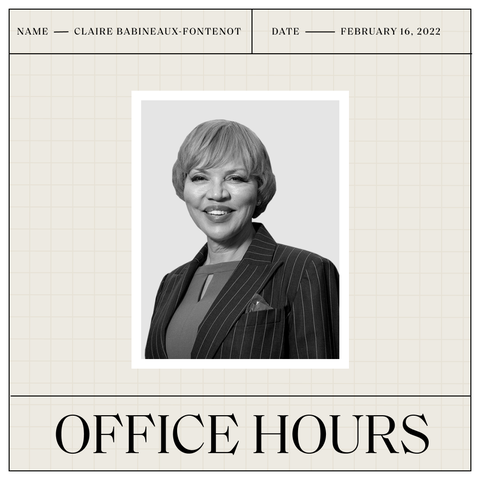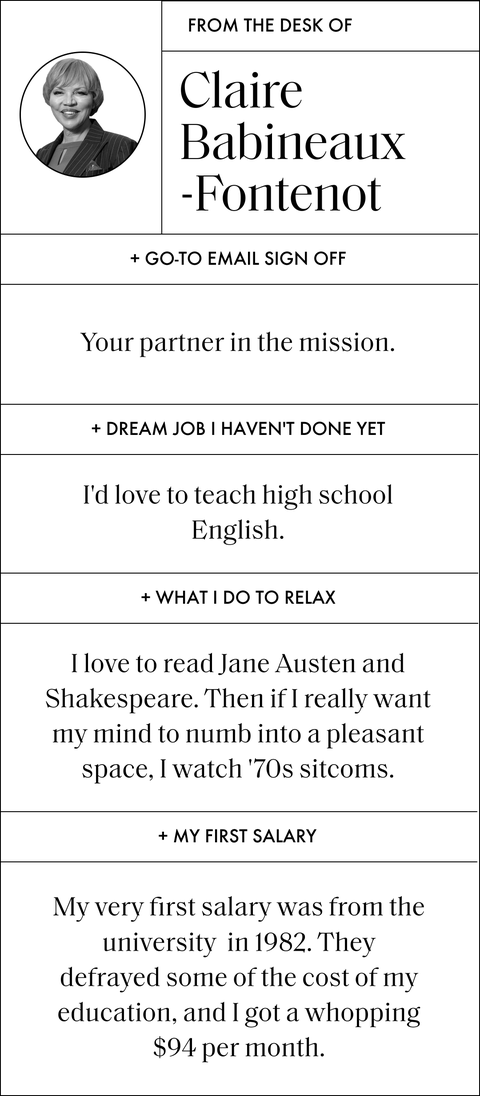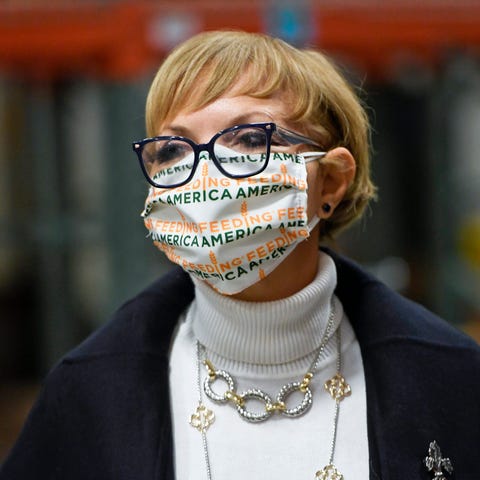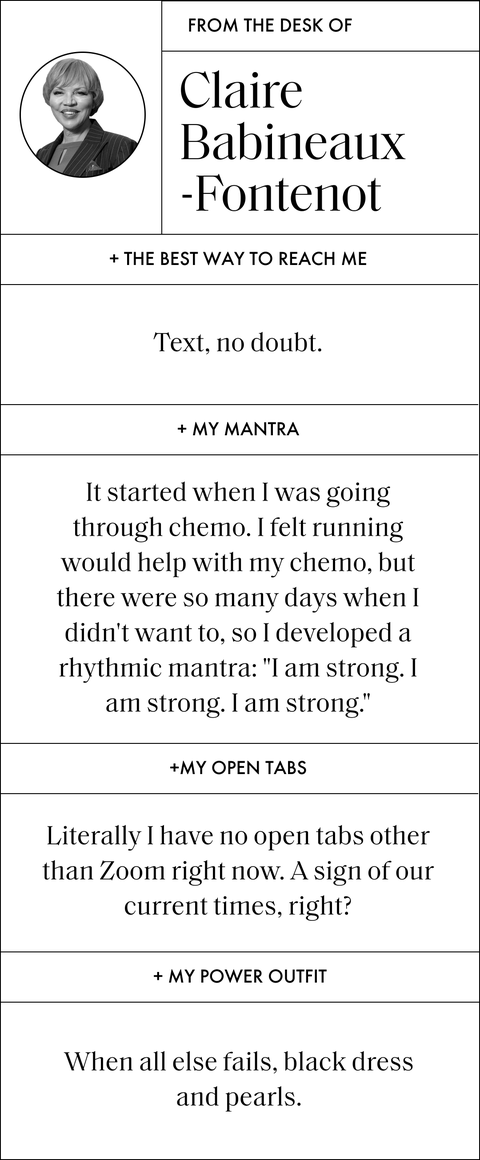
In ELLE.com’s monthly series Office Hours, we ask people in powerful positions to take us through
their first jobs, worst jobs, and everything in between. This month, we spoke with Claire Babineaux-Fontenot, the CEO of Feeding America, the largest domestic hunger-relief organization in the U.S.Babineaux-Fontenot is used to big titles; after starting her career as a tax lawyer, she went on to work for the leadership team at Walmart for 13 years. But after she was diagnosed with cancer in 2015, she decided to reassess. She joined Feeding America in 2018, and shortly after, Babineaux-Fontenot was tasked with guiding the organization through the pandemic, as Feeding America’s 200 food banks and 60,000 food pantries and meal programs became a lifeline for millions of people. Here, Babineaux-Fontenotshares how she kept her spirits up during the worst moments of COVID-19, how her unconventional childhood influenced her career, and why she’s more than fine with letting her co-workers see her sweat.
My first job
My first job outside of our house was working in the library at the University of Louisiana at Lafayette. I had to go around and find books that were not where they were supposed to be. Most of my time was spent looking under tables and picking up after students who didn’t have the respect for the books that I had. It didn’t allow for a lot of opportunity to engage with people. As much as I love books—I love holding them in my hand, I love the way they smell, I love to read—I learned I was not supposed to be a librarian.

How growing up with 107 siblings drove my career
Through biology, adoption, and fostering, there were 108 of us children over the course of my mom and dad’s time together, which spanned almost 54 years. Until 2004, I seldom talked about my childhood. The reason I started talking about it more is because it has everything to do with everything; all of my personal and professional aspirations started with growing up in that home. The normal path to becoming part of our family was that the family you were born to was not high-functioning. There’s trauma associated with that. So I wanted to be a children’s rights advocate. I wanted to be a lawyer. It came from growing up in our home and thinking about how might I use my voice to lift up the voices of my brothers and sisters.
Why I consider my cancer diagnosis a gift
I became a lawyer, but I didn’t practice the kind of law I thought I was going to. I stumbled into becoming a tax lawyer and kept getting tapped for new opportunities. All that time, I knew why I became a lawyer. I saw firsthand the needs that exist inside of communities. I saw firsthand the power that people have to impact their communities. I knew all of this. But I was moving along, thinking, “I’ve got plenty of time.” I was acting like a person who could get to it later. Then the weekend of my 51st birthday, I went to get an executive physical, and I learned that I had cancer. Everything just started moving in slow motion. Once I had that diagnosis, I had so much clarity that said, if I survive this cancer, I willdo those things that I thought I’d do “one day.” I had a great prognosis, access to brilliant doctors, remarkable medical care. As a consequence, I have done really well with the cancer. Cancer, for me, was a beautiful gift that came in an ugly package, because I’m pretty sure I would’ve kept convincing myself to wait. And I’m glad that I didn’t.

How I stayed hopeful at the height of the pandemic
It felt like everything changed overnight. I thought one of my key responsibilities would be to make sure America knew what was happening, to lift up people experiencing food insecurity, to help people understand how bad things were and also understand they were well-positioned to be a part of solutions. I started traveling to food banks in the heart of the pandemic. I really thought I should do this out of a sense of duty. Here are our members out on the frontlines, and I had put in place a travel ban and told the national office they couldn’t be there, so I should be there. But at that first food bank visit during the pandemic, I realized, this is a privilege. Think about all of the things that happened in 2020, all of the things that happened in 2021, all of the things that are still happening right now, all of those moments that may have caused us to ask ourselves: Are there good people in the world? I knew the answer was yes. Every single place I went, I found people standing shoulder-to-shoulder with their neighbors, finding ways to be helpful. There is goodness in the world. I see it all the time. That keeps me going.

The best career advice I’ve ever received
I was having a terrible time with a boss. I found someone who I knew didn’t like the boss, who’s a mentor of mine, and I went to him knowing in my bones, we’re about to slam this boss. So I came in and said, “Let me tell you what this boss is doing wrong.” And the person said, “You are focusing on all the wrong things. Rather than putting your energy on who your boss is not, refocus and spend some meaningful time understanding who he is, what matters to him. Then ask yourself, can you and he win at the same time?” It pivoted my whole thinking. One lesson was that when you have the opportunity to give advice, you should think about it as a responsibility to not just lean into what the person wants to hear. But the other lesson was it really did change the way I looked at those types of situations. I ended up thriving with that particular boss, because at the end of the day, we really wanted the same things.
The reason I show up to work as my full and flawed self
When you have so many people who are counting on you to be helpful, if you aren’t willing to let them see you sweat, that’s not real. That’s inauthentic. It’s particularly hurtful for people who show up at work knowing that they fall into some “other” status, either as women or as people of color or as non-binary. There’s this inordinate burden that society places on us, that we place on ourselves, to come in perfectly. I feel as a woman, a woman of color, with eyes at least partly open, I have a unique opportunity, privilege, and responsibility to make it clear that you don’t have to have all of the answers. What I do have is confidence in the ability of the people I surround myself with to make meaningful and positive change. I have confidence I can be a part of that.
This interview has been edited and condensed for clarity.
